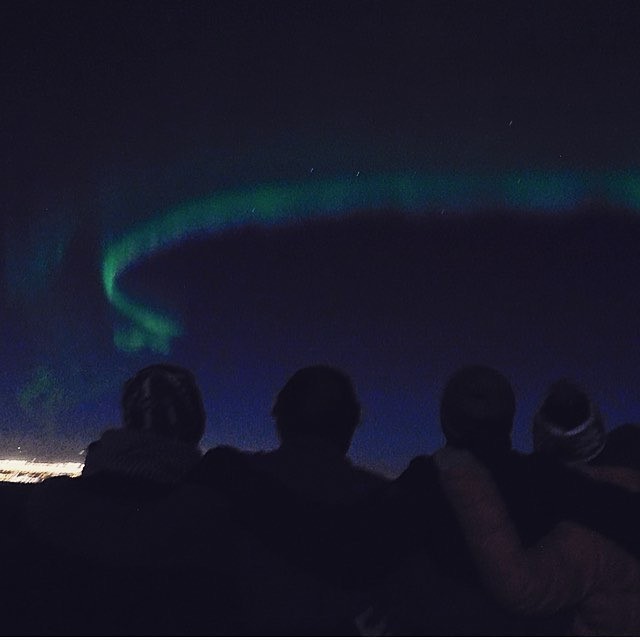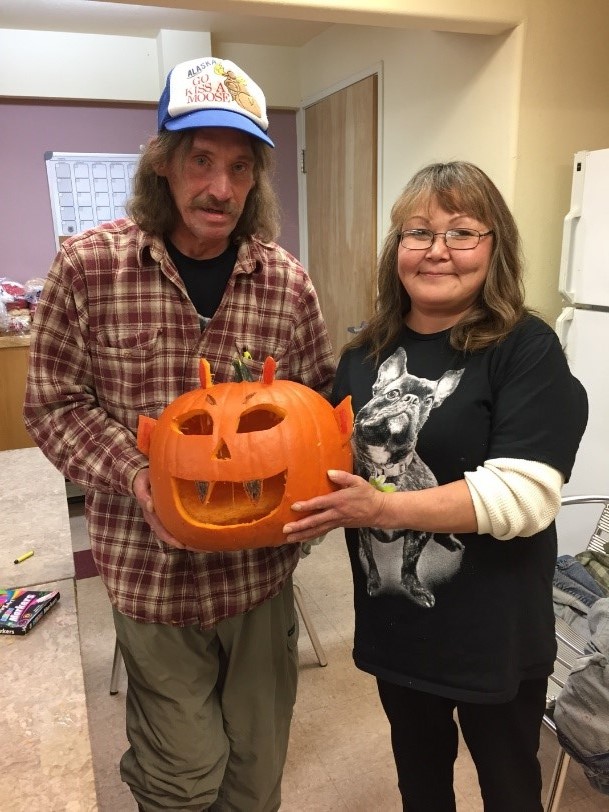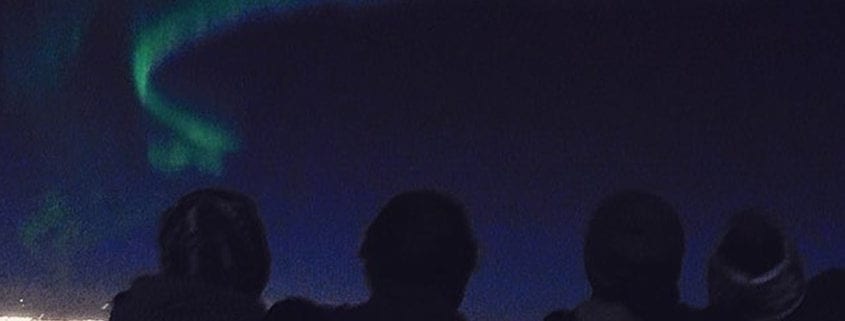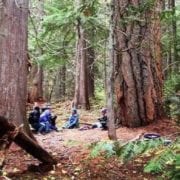Finding Beauty in the Last Frontier
BY DANI XIONG | December 20, 2016
Welcome to America’s last frontier. In front of your eyes are handsome mountains with Denali far off in the distance, free roaming wildlife, mesmerizing northern lights, and all things nature in an untamed land. Welcome, and stay awhile in the heavenly paradise that is Alaska.

Members of the Anchorage Jesuit Volunteer community watch the Northern Lights dance above the city’s lights.
To a tourist, Alaska’s glamour might be all that he or she sees. However, as a Jesuit Volunteer and AmeriCorps member, I see much more than Alaska’s astonishing attractions. Underneath the surface of beauty, I am exposed to the many challenges Alaska faces as a state. Over the past three months that I have lived in Anchorage, I have seen people experiencing homelessness camping out in the freezing cold; I’ve seen the local news reporting shootings, robberies, and homicides, accompanied by sirens ringing in the air. It is a strange juxtaposition . . . to be in such a beautiful place with so much ugliness at the same time.
I didn’t know much about Alaska before I moved to Anchorage, and I certainly was not aware of the severity of the issues of homelessness and alcoholism here. I serve as Client Relational Support at Karluk Manor, a permanent supportive housing facility for individuals who have suffered from chronic homelessness and alcoholism. Karluk operates under a housing-first model, where the goal is to house the most vulnerable homeless population and subsequently offer case management services to help tenants achieve self-sufficiency. The housing-first model has been controversial because it allows tenants to continue using alcohol, and it has prompted harsh criticism from the Anchorage community.
It’s not unusual to see clients walking around intoxicated, and I’ve slowly learned how to best interact with them when they have had several drinks. I’ve had tenants tell me they want to sober up and get a job; I can only imagine how difficult it would be to quit drinking when there’s so much temptation right next door. It’s heartbreaking to keep hearing that they want to quit, and then seeing that they turned to a bottle again the next day.
Housing is a basic human right, one that Karluk Manor fights for.
Though I sometimes feel defeated, I never fail to get back on my feet because I always find hope around the corner, particularly in one of our clients, Betty. I see Betty as someone with great potential to achieve sobriety, but uncontrollable factors have chained her down. When I first started at Karluk, Betty was constantly intoxicated and often caught up in altercations with other clients. She was acting out so much that she became extremely close to getting a 10-day notice for eviction. While it’s easy to condemn her behavior, no one has the right to judge without knowing what she’s been through. One day, as I drove Betty to her doctor’s appointment, we chatted about family. When I asked her if she had seen her children recently, she started crying and responded, “No, they don’t care. I don’t know where they are.” I have not heard Betty’s entire story, but I can sense her burning agony through her detrimental drinking episodes, her screaming and weeping, and the scars she wears on her body. So, I won’t be quick to judge, and I won’t chastise, because I know that sometimes, alcohol might feel like the only device to numb her pain. Yet, Betty has really turned around the past several weeks. She has remained sober, and has been going to doctor’s appointments and participating in activities I’ve organized, such as the Pumpkin Carving Party last month. She helps to pick up trash around Karluk, looks out for other tenants, and jokes around with a cheerful smile. Housing is a basic human right, one that Karluk Manor fights for. And in the field of human services, I only wish to work to preserve and advocate for human dignity, for Betty and others alike.

Betty and her husband, who also lives at Karluk, with their carved pumpkin.
In measuring success, I want to know that I am “making a difference” and I want results now. I don’t think this kind of impatience is uncommon among my generation. However, I must continue to remind myself that this is difficult at Karluk Manor due to the nature of the services provided and the population we serve. When clients get dentures, hearing aids, make it to a doctor’s appointment, and stay sober for periods of time, that shows that they have implemented an action to improve their wellbeing, and even these small victories are big steps forward.
Still, I am frustrated by is the overall lack of resources devoted to the nonprofit sector, an issue that we as a society have created. We’ve all talked and theorized about this sort of systematic injustice, but I’ve seen it eerily come to life at Karluk Manor. Due to limited funding, we have two case managers and one clinician for 46 tenants, which means that we can’t always give tenants the care and attention to fulfill their immediate needs, and it’s disheartening having to say no to a tenant. This reinforces their perception that they’re not important, and when they don’t think they’re cared about, they may then turn to their bottle. This is only part of the larger, pervasive problem plaguing the nonprofit sector, and I can’t help but feel helpless.
Karluk Manor and housing-first are merely one of the missing puzzle pieces to relieving the problem of homelessness. As I journey through my year as a Jesuit Volunteer, I intend to continue pursuing and appreciating the small victories, in which I find infinite hope. I know that I will experience many more frustrations and seemingly hopeless moments, but I also know that I can always be comforted by the presence of hope all around me. Even when justice seems to be undermined by the system, I see hope in the people I serve with, and the people I serve for.
So, welcome to beautiful Alaska, and stay a while. If you look close enough, you’ll see not only the beauty on the surface, but also the beauty beneath, where hope resides.
#JVReflects explores the intersection of faith and justice from the perspective of JESUIT VOLUNTEERS serving as long-term volunteers both domestically and internationally with Jesuit Volunteer Corps and Jesuit Volunteer Corps Northwest. Reflections specifically focus on the cornerstone values of the Jesuit volunteer experience: spirituality, simple living, community, and social justice.
Dani Xiong is a Jesuit Volunteer serving in Anchorage, AK as Client Relational Support at Karluk Manor at RurAL CAP. She is was born in China, grew up in Fort Collins, CO and attended Boston College graduating with a degree in Marketing & Information Systems.









Proud of you, Dani! You’ve made a difference.